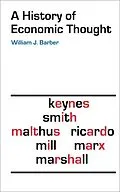This critical study of the development of systematic economic ideas explores them in both historical and contemporary contexts. Many of the issues that faced economists in the past are still with us. The theories and methods of such men as Adam Smith, T. R. Malthus, David Ricardo, J.S. Mill, Karl Marx, Alfred Marshall, and J. M. Keynes are often relevant to us today. As the Great Recession taught us in the first decade of the twenty-first century, the history of economic thought can have wide-ranging practical applications. In this volume, Professor William J. Barber assesses the thought of a number of important economists both in terms of the issues of their day and in relation to modern economic thought. By concentrating on the greatest exponents, he highlights the central properties of the four main schools of economic thought-classical, Marxian, neo-classical, and Keynesian-and shows that although each of these traditions is rooted in a different stage of economic development, they can all provide insights into the recurring problems of modern economics.
Autorentext
WILLIAM J. BARBER is Andrews Professor of Economics, Emeritus at Wesleyan University in Middletown, Connecticut, where he taught from 1957 to 1993. He has served as the president of the History of Economics Society (1989-1990) and in 2002 was named a Distinguished Fellow of that society.
Inhalt
Acknowledgments Prefatory Note Prologue CLASSICAL ECONOMICS Introduction Adam Smith and the Framework of Classical Analysis Elaborations and Cleavages within the Classical System: Thomas Robert Malthus David Ricardo and the Formalization of Classical Analysis The Revisionism of John Stuart Mill Postscript to Classical Economics MARXIAN ECONOMICS Introduction Karl Marx and the Economics of Das Kapital Postscript to Marxian Economics NEO-CLASSICAL ECONOMICS Introduction Alfred Marshall and the Framework of Neo-Classical Economics Pre-1914 Variations on Neo-Classical Themes Postscript to Neo-Classical Economics KEYNESIAN ECONOMICS Introduction The Economics of Keynes's General Theory Postscript to Keynesian Economics Epilogue Index of Proper Names Index of Concepts and Terms
